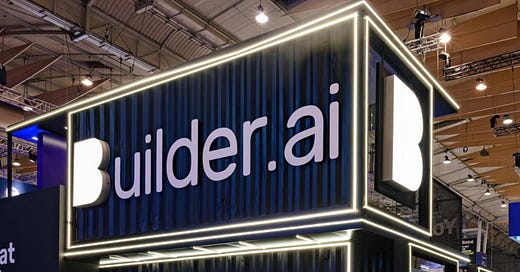$1.5-Billion AI Unicorn Builder.ai Collapses
How the startup’s downfall offers a cautionary tale for AI investors
Welcome to another edition of AI 101, where every Wednesday we bring you the biggest AI update of the week.
This Week’s Update: Builder.ai, Once Valued at $1.5 Billion, Set To File for Bankruptcy
On May 20th, Builder.ai announced it was entering insolvency proceedings with plans to file for bankruptcy after a major creditor seized $37 million in cash. The company, founded in 2016, offered an AI-powered platform that allowed users to build custom apps without any code. In 2023, Builder.ai raised over $250 million in a funding round that brought its total valuation to $1.5 billion. It also announced a strategic partnership with Microsoft which included an equity investment.
Recent reports allege that Builder.ai employed over 700 human engineers in India to manually write code for clients, work that the company presented as AI-generated. Bloomberg also reported that the startup faked business with an Indian social media company called VerSe Innovation to falsely inflate sales.
Why This Is Important
Builder.ai’s downfall serves as a stark reminder of the risks that investors face in the AI boom. Since ChatGPT exploded in popularity in early 2023, investors have poured hundreds of billions into AI startups. According to Dealroom, 42% of venture capital raised in the U.S., approximately $80.7 billion, went to AI startups last year. Venture firm profits have stalled in recent years, in part due to skyrocketing investment in AI companies which burn through cash without generating significant returns.
The reports that Builder.ai employed 700 Indian engineers to compensate for its technical inability present another warning to investors: companies are willing to overstate their technological capabilities to rush products to market and ride the AI wave. The failed startup would not be the first to use this strategy. Last April, The Information revealed that Amazon’s cashierless “Just Walk Out” technology in its stores partly relied on over 1000 Indian workers.
After betting big on AI, investors are now faced with the fragility of high-growth startups that hemorrhage cash. The collapse of one unicorn startup by no means signals an end to the AI revolution. It does, however, show how quickly investor hopes can be dashed by rapidly growing startups that focus more on optics than their core business.
Quick Hits:
On Thursday, Chinese AI company DeepSeek released the first update to its R1 reasoning model, bringing its performance closer to Gemini 2.5 Pro and OpenAI o3. The model drew criticism after testing found the chatbot was highly censored.
Elon Musk attempted to block OpenAI’s AI deal in the U.A.E., warning that President Trump would not approve it unless his own startup, xAI, was included. Despite his objections, the deal moved forward.



